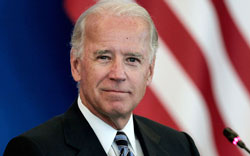Joseph R. Biden was elected the 46th president of the United States of America on Saturday, Nov. 7, after he gained a clear lead in the vote count in Pennsylvania, following a week of slowed vote tallies in the key battleground states due to an unprecedented surge in mail-in ballots.
When vote counts neared completion in Philadelphia and Pittsburgh, President Trump’s lead disappeared and solidified Biden’s victory.
The Black community saved Biden in the Democratic primary, delivering him 25 percent of the votes in South Carolina, explained Joseph Patten, an Associate Professor of Political Science. “Biden got the party’s nomination because of African Americans and won the presidency because of African Americans,” he said.
But the election did not hinge on Biden’s ability to convert voters in the suburbs; it came down to racially diverse urban areas in Pennsylvania, Michigan, Wisconsin, Arizona, Nevada, and Georgia. After vote counts from Detroit, Milwaukee, and Atlanta flooded in, Trump’s election night lead faded, according to the Associated Press.
Biden appealed to Black Americans amid Trump’s response to the coronavirus pandemic, which disproportionately affected people of color, and the Black Lives Matter’s protests. Shadiyah Belton, President of the Black Student Union, said, “Biden and Harris’ acknowledgement of the disparities that black people have faced in relation to healthcare, education, economic opportunity, and the effects of COVID, had a huge impact on the amount of support he received from Black voters.” Biden’s familiarity with these issues due to his ties with former President Barack Obama increased his popularity, she noted.
Selecting Senator Kamala Harris (D-CA) as a running mate confirmed that representation matters in politics. Patten said that “Identity politics is a major factor in American politics… in the context of George Floyd, it would almost be difficult to conceive of a race that didn’t have a person of color in it.”
Harris will be the first woman elected Vice President of the United States. Zachary Dougherty, President of the Democratic Club, said, “I don’t think we can trivialize the impact [Harris’ election] will have on future generations of aspiring young women.”
Another factor that might have propelled Biden forward is a surge in youth voter turnout. “We turned the tide of voter efficacy for young Americans who are traditionally apathetic to our democratic process,” Dougherty said.
Patrick Murray, Director of the Monmouth Polling Institute, was not surprised by how close the race was. “From the beginning of this election cycle, I warned to be prepared for a wide range of electoral and popular outcomes. This election is different: a lot of people overestimated Biden and underestimated Trump,” he said. Referencing the poll deviations, Murray explained there has been difficulty polling Trump and his supporters.
“People expecting a big so-called ‘blue wave’ on Tuesday night were probably disappointed,” Murray said. “We saw that blue wave barely hold in suburbia, but in few other places. Biden also flipped the right amount of support among college-educated and non-college-educated white men, but it shouldn’t be understated that this was largely a rejection of Trump.”
“Surely political pollsters represent one of the biggest ‘losers’ of the 2020 election,” said Kenneth Mitchell, Professor and Chair of the Political Science Department. “Mainstream polls in the crucial battleground states missed the mark by a wide margin…What’s the value of a political poll in Iowa, only days before the election, with Biden up three percent when Trump wins the state by eight percent?”
In terms of policies Americans can expect from Biden’s presidency, Mitchell explained he does not expect significant policy legislature until the 2022 midterm elections since Republicans will likely retain their Senate majority.
“Executive orders will be the area of policy change under Biden,” Mitchell said. “A return to the Paris Climate Accord, the Iran Nuclear Deal, a reversal of Trump EPA policies, and more support for NATO… There is virtually zero chance that the GOP Senate would pass the tax hikes Biden and Harris campaigned on. Thus, public revenue, already low from the pandemic’s economic carnage, will be too low to support new spending initiatives.”
Dougherty believes that “President-Elect Joe Biden will work to unify our country.” But Mitchell is a bit less optimistic, suggesting that Biden’s centrism would clash with both the GOP Senate and progressive Democrats in the House. “Biden’s centrist campaign won enough votes in Pennsylvania, Arizona and Georgia to win the election, but not enough to win at the congressional level. Divided government tends to stall significant legislation,” he said.
Mitchell added that “the country is deeply divided with no ‘centrist path’ on most of the big issues of the day—climate change, income inequality, healthcare, racial justice, taxes, college tuition, [and] China policy.” Polarization is “firmly in place,” and Mitchell is not expecting a shift soon.
However, Michael Phillips-Anderson, Ph.D., an Associate Professor of Communication, suggests that our division as a country is mostly represented in our structure of government. Even states that voted for Trump passed liberal ballot measures: Florida raised the minimum wage and Montana and South Dakota legalized marijuana.
“On nearly every issue, the majority of Americans agree with Democratic positions,” noted Phillips-Anderson. “Also that Democrats have won the popular vote in seven of the last eight presidential elections. I think that Biden’s win but the Democrats failure to take back the Senate doesn’t mean that the Democrats have the wrong position on the issues. Their problem is that they have a small but significant Democratic majority in a system that keeps minoritarian (in this case, conservative Republican) power in place,” he explained.
But not all parties accepted Biden’s victory. Carlie Zeidler, President of the College Republicans, said, “It’s definitely not over yet, but we will see how the courts handle it. We support President Trump’s decision to file lawsuits and expose the truths about fraudulent acts regarding the election process. If nothing is found in court, then we will respect whomever the President Elect may be.”
Patten explained that one of the benefits of local control in federal elections is that it makes widespread corruption difficult. “There is no credible evidence of wide-scale voter fraud, losing is not something that comes easily for Trump, but the lawsuits are not going to materialize into anything,” he said.
IMAGE TAKEN from New York Post




